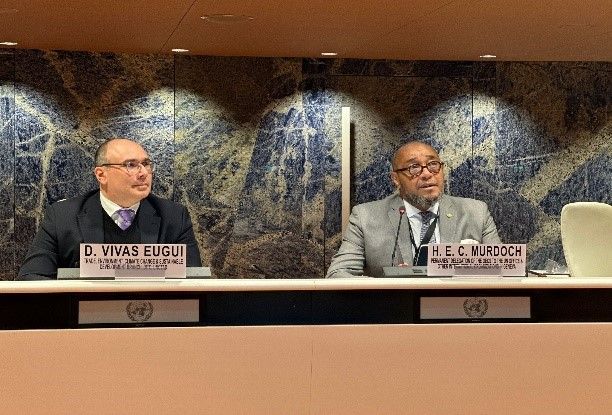OECS Delivers Keynote Address at the UNCTAD 7th BioTrade Congress
OECS Media Release
The United Nations Conference on Trade and Development (UNCTAD) hosted its 7th BioTrade Congress from March 25 to 26, 2024 at the UN Headquarters in Geneva, Switzerland. The BioTrade Congress is a global event that unites trade and biodiversity experts and practitioners for a high-level exchange on key issues concerning the links between trade and biodiversity. This year’s Congress focused on the BioTrade for the sea moss and sargassum value chains.
The Permanent Mission of the Organisation of Eastern Caribbean States (OECS), in Geneva, had the distinct privilege of participating, with H.E. Ambassador and Permanent Observer Colin Murdoch delivering the keynote address. Ambassador Murdoch emphasised the current challenges caused by the surge in sargassum plaguing the coastlines of OECS countries. He highlighted the need for OECS Member States to explore the development of their blue economies, given their extensive Exclusive Economic Zones (EEZs) and the importance of the sea moss and sargassum value chains for Small Island Developing States (SIDS), which he viewed as providing avenues for increased economic development. Furthermore, Ambassador Murdoch expressed,
“As SIDS we should be cautious so as not to repeat historic patterns where we specialize in exporting raw materials and reimporting the finished products which are higher in value.”
The panel for the 7th Congress comprised representatives from UNCTAD, the UN Food and Agriculture Organization (FAO), the Global Seaweed Coalition, Shridath Ramphal Centre for International Trade Law Policy and Services at the University of West Indies, and the London-based startup company Notpla.
The issues addressed by the panel were:
- Mainstreaming biodiversity into trade discussions and processes
- Trade, The Biodiversity Plan and National Biodiversity Strategies and Action Plans
- Trade and biodiversity: case studies in equity and innovation
- Benefits of the blue economy – the seaweed value chain
- The future of BioTrade: reflections and impacts at the national and regional levels
The event was part of the activities planned by UNCTAD and partners towards the 16th meeting of the Conference of the Parties (COP 16) to the Convention on Biological Diversity (CBD), as well as UNCTAD’s 60th anniversary and its 16th quadrennial Ministerial Conference in 2025. The outcome of this Congress is expected to support the implementation of UNCTAD’s Bridgetown Covenant, the Biodiversity Plan, and the Sustainable Development Goals (SDG).
Claudia Mc Dowell
OECS Communications Unit


